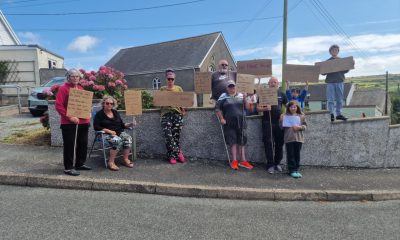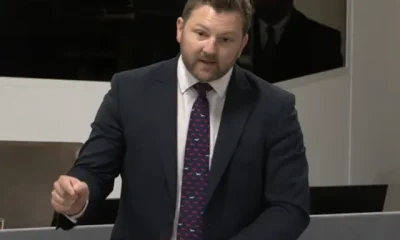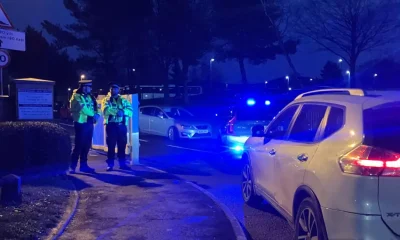Politics
Significant concerns for EU citizens in Wales
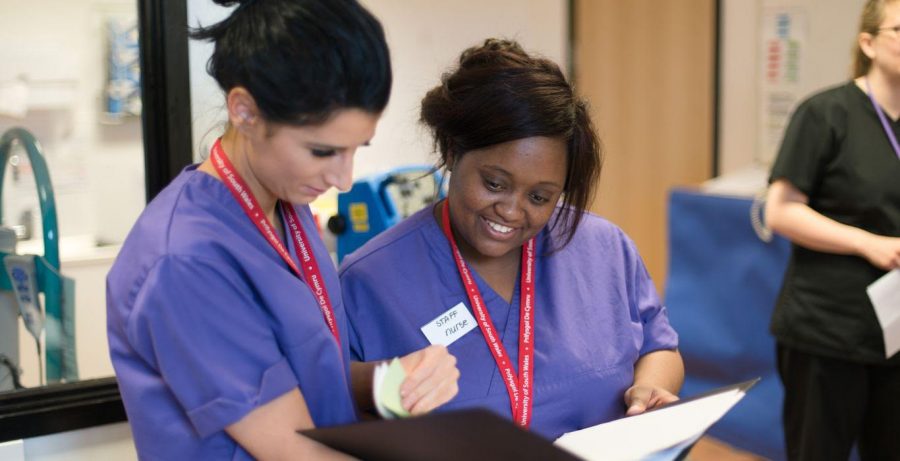
THE UK Government’s EU Settlement Scheme (EUSS) is causing significant problems for EU citizens currently living and working in Wales.
LOW REGISTRATION IN WALES
Wales has the lowest rates of registration in the UK.
Only 41% of those eligible to apply for EUSS to stay in Wales after Brexit have done so.
The rhetoric surrounding EU migration since the referendum has taken its toll on people’s emotional wellbeing, meaning they no longer feel welcome to live here.
The UK Government has proposed a £30,000 salary threshold for EU residents to qualify for a work visa after Brexit. This could damage the Welsh economy and leave Wales short of key health professionals, say Welsh employers.
The National Assembly for Wales’ External Affairs and Additional Legislation Committee, which focuses on the implications of Brexit for Wales, is today publishing a report looking at the impact of changes to ‘freedom of movement’ after Brexit. As well as the impact on services and employers, the Committee has looked at the effect on individual EU citizens currently living and working in Wales – there are currently an estimated 80,000.
The Committee heard evidence from a range of health professionals, employers and individuals who would be affected by the proposals to change the immigration system after Brexit.
Organisations representing employers and key workers including the Welsh NHS Confederation, the Royal College of Nursing Wales, Airbus, Universities Wales, Wales TUC and the Arts Council for Wales have voiced serious concerns to the Committee. The UK Government’s proposals for EU citizens after Brexit cause concern to health services and businesses. Under the UK Government’s proposals almost two-thirds of EU workers currently in Wales would not be eligible under the proposed system with the £30,000 salary threshold, and the threshold would lead to a 57% reduction in EU immigration to Wales over 10 years.
EU SETTLEMENT SCHEME – DIGITAL BY DEFAULT
As part of the Committee’s inquiry, it heard evidence from people directly affected by the changes to freedom of movement after Brexit.
The EU Settlement Scheme (EUSS) was established by the UK Government because, in most cases, EU citizens living in the UK will no longer have a legal right to reside in the UK once it leaves the EU and free movement ends.
EU citizens living in the UK must register for the EUSS.
The Committee heard many concerns about the system to register. The UK Government has adopted a ‘digital by default’ approach and there have been issues with the technology. The current system only allows the use of Android phones or tablets, not iPhones.
£30,000 THRESHOLD – TOO HIGH FOR WALES
The Welsh NHS Confederation, the membership body representing all NHS organisations in Wales, told the Committee that the proposals to include EU citizens in its £30,000 salary threshold for a visa would “exacerbate current staffing shortages”. It highlighted that 53% of EU NHS staff currently earn below that.
The Bevan Foundation highlighted that the average salary in Wales for full-time workers is £26,000, significantly below the proposed threshold. Airbus, a large employer in Wales, added that the threshold is “too high for key sectors” which could have implications for many services and industries. They argued that the proposals from the UK Government could “leave gaps in the requirements of Wales which can’t be filled in the short term.”
The Committee believes that a salary threshold set at this level will not meet the needs and requirements of the Welsh economy. It is calling on the UK Government to lower the salary threshold requirements and is recommending that the Welsh Government uses all the means at its disposal to ensure that the currently proposed salary threshold is reduced.
FEELING UNWELCOME
The Committee heard evidence from people affected directly and how many people felt that they were no longer welcome in the UK following the EU referendum.
Some argued that the policy pursued by the UK Government since the referendum has exacerbated this.
Several people said that some of the rhetoric relating to the issue of EU migration had hardened and described the toll that this had had on their emotional wellbeing, and that of friends and family members.
One participant emphasised that it is not simply an administrative process, but that real people are involved and that it was important to remember how the process affects them.
Michal Poreba from Swansea, an EU citizen originally from Poland, who gave evidence to the Committee’s inquiry, said: “The EU settlement scheme and the UK Government’s immigration proposals after Brexit are not simply about administrative processes, they are about people’s lives. Real people are involved and it is important to consider how the process affects them and their families. Yet the debate appears to be all about the practicalities of the implementation.
“Questions are asked why so few people have registered so far and how to increase the uptake. But what does it offer? Why would anybody apply? The facts are that the scheme significantly reduces the rights of the applicants. Going through the process, while technically quite easy and straightforward, feels debilitating and comes with no legal guarantees. It feels like an act of political self-harm. No wonder there are no queues to do it.
“The message repeated by politicians appears to be the same – You will be allowed to stay. We want you to stay. Of course, economically speaking they need us to stay, at least for the short term. But there is a big difference between being allowed to stay, and being welcomed. There is a big difference between a legal right and permission.”
SHORTAGE OCCUPATION LIST
Wales has specific needs. The Shortage Occupation List is an official list of occupations for which there are not enough resident workers (including EU nationals) to fill vacancies. The UK list is supplemented by a separate list for Scotland.
The majority of those who gave evidence to the Committee supported the creation of a Wales-specific Shortage Occupation List to meet the specific needs of Wales. The Committee is calling on the UK Government to establish this, which the Welsh Government would be able to amend according to Welsh needs.
David Rees AM, Chair of the External Affairs and Additional Legislation Committee said: “We have significant concerns about the implications of Brexit on our workforce in Wales. The ending of freedom of movement will have consequences for business and our economy if we lose vital workers. What’s more worrying is the impact that the loss of EU citizens could have on our NHS. We rely on EU citizens who work as nurses and carers.
“We heard some very concerning and emotional evidence from EU citizens and their families living and working in Wales. We must not forget the human impact that the ending of freedom of movement will have.
“We are calling on the Welsh Government to do all it can to get the UK Government to reduce its proposed salary threshold of £30,000 in order to better reflect average earnings here in Wales. Under these proposals, almost two-thirds of EU workers currently in Wales would not be eligible to live here. This could mean that we would not be able to recruit key workers such as nurses and carers from abroad.
“The EU Settlement Scheme for those who already live and work in Wales is full of problems, with an online-only application process and limited access on smartphones, these problems must be addressed urgently.
“Wales’ economy has specific needs and changing demographics within Wales, including an ageing population, are likely to pose new challenges in the future. These challenges within the economy of Wales are likely to be exacerbated by an overly restrictive immigration regime after Brexit.
“Today we’re calling on the Welsh Government to show real leadership and send out a strong message that EU citizens are welcome, valued, and needed in Wales and we’re calling on the UK Government to rethink its proposals and take into account the needs of the Welsh economy and public services.”
Business
Cosheston Garden Centre expansion approved by planners
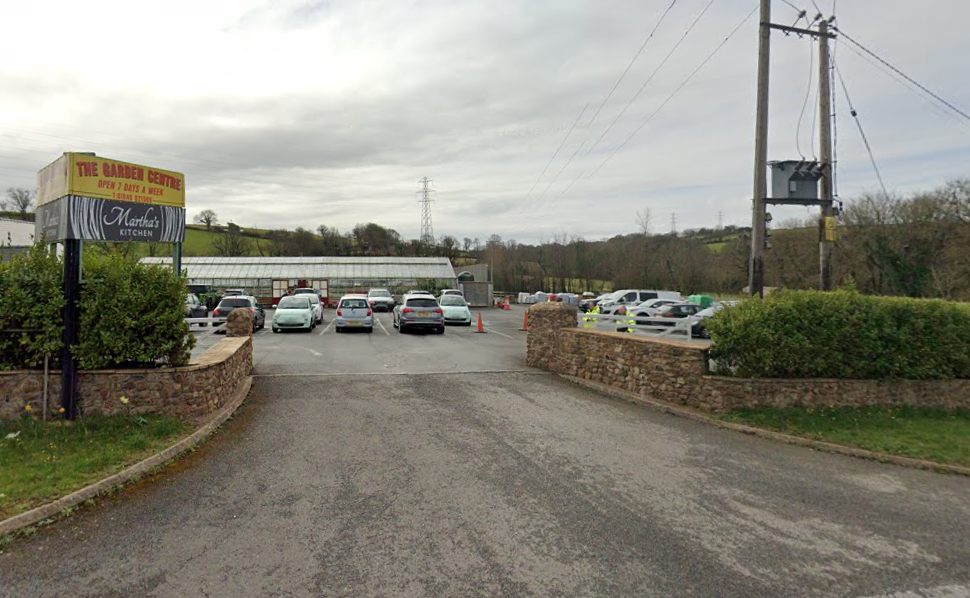
PLANS to upgrade a garden centre on the main road to Pembroke Dock have been given the go-ahead.
In an application to Pembrokeshire County Council, submitted through agent Hayston Developments & Planning Ltd, Mr and Mrs Wainwright sought permission for upgrade of a garden centre with a relocated garden centre sales area, additional parking and the creation of ornamental pond and wildlife enhancement area (partly in retrospect) at Cosheston Garden Centre, Slade Cross, Cosheston.
The application was a resubmission of a previously refused scheme, with the retrospective aspects of the works starting in late 2023.
The site has a long planning history, and started life as a market garden and turkey farm in the 1980s, and then a number of applications for new development.
A supporting statement says the previously-refused application included setting aside a significant part of the proposed new building for general retail sales as a linked farm shop and local food store/deli in addition to a coffee bar.
It was refused on the grounds of “the proposal was deemed to be contrary to retail policies and the likely impact of that use on the vitality and viability of nearby centres,” the statement said, adding: “Secondly, in noting that vehicular access was off the A 477 (T) the Welsh Government raised an objection on the grounds that insufficient transport information had been submitted in respect of traffic generation and highway safety.”
It said the new scheme seeks to address those issues; the development largely the same with the proposed new garden centre building now only proposed to accommodate a relocated garden centre display sales area rather than a new retail sales area with other goods, but retaining a small ancillary coffee bar area.
“Additional information, in the form of an independent and comprehensive Transport Statement, has now been submitted to address the objection raised by the Welsh Government in respect of highway safety,” the statement said.
It conceded: “It is acknowledged that both the creation of the ornamental pond and ‘overspill’ parking area do not have the benefit of planning permission and therefore these aspects of the application are ‘in retrospect’ and seeks their retention.”
It finished: “Essentially, this proposal seeks to upgrade existing facilities and offer to the general public. It includes the ‘relocation’ of a previously existing retail display area which had been ‘lost’ to the ornamental pond/amenity area and to provide this use within the proposed new building and moves away from the previously proposed ‘farm shop’ idea which we thought had merit.
“This revised proposal therefore involves an ‘upgrading’ rather than an ‘expansion’ of the existing garden centre use.”
An officer report recommending approval said that, while the scheme would still be in the countryside rather than within a settlement boundary, the range of goods sold would be “typical of the type of goods sold in a garden centre and which could be sold elsewhere within the garden centre itself,” adding: “Unlike the recent planning application refused permission it is not intended to sell delicatessen goods, dried food, fruit and vegetables, pet products and gifts.”
It added that a transport statement provided had been reviewed by the Welsh Government, which did not object on highway grounds subject to conditions on any decision notice relating to visibility splays and parking facilities.
The application was conditionally approved.
Business
Tenby Poundland site could become retro gaming lounge
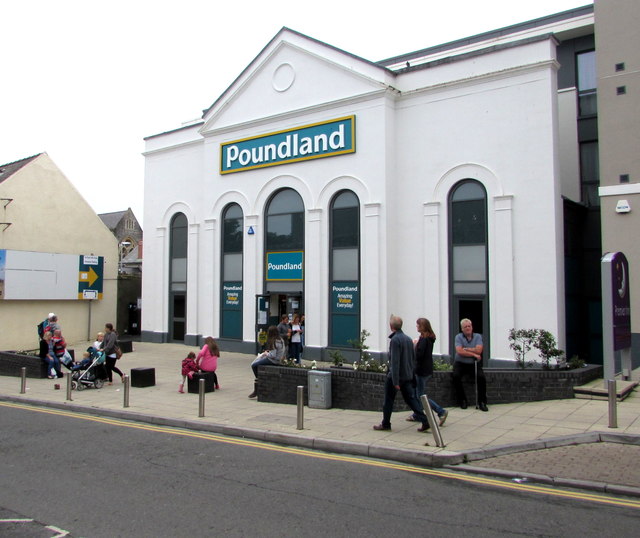
TENBY’S former Poundland and Royal Playhouse cinema could become a retro computer gaming lounge, plans submitted to the national park hope.
Following a takeover by investment firm Gordon Brothers, Poundland shut 57 stores earlier this year, including Tenby.
Prior to being a Poundland, the site was the Royal Playhouse, which had its final curtain in early 2011 after running for nearly a century.
The cinema had been doing poor business after the opening of a multiplex in Carmarthen; in late 2010 the opening night of the-then latest Harry Potter blockbuster only attracted an audience of 12 people.
In an application to Pembrokeshire Coast National Park, Matthew Mileson of Newport-based MB Games Ltd, seeks permission for a ‘CONTINUE? Retro Gaming Lounge’ sign on the front of the former Gatehouse (Playhouse) Cinema, White Lion Street, most recently used as a Poundland store.
The signage plans form part of a wider scheme for a retro gaming facility at the former cinema site, which has a Grade-II-listed front facade, a supporting statement through agent Asbri Planning Ltd says.
“The subject site is located within the settlement of Tenby along White Lion St. The site was formerly the Gatehouse Cinema and currently operates as a Poundland discount store, which closed on October 18.”
It adds: “This application forms part of a wider scheme for the change of use to the former Gatehouse Cinema. Advertisement consent is sought for a non-illuminated aluminium composite folded panel that will be bolted onto the front façade of the proposed building, in replacement of the existing signage (Poundland).”
It stresses: “It is considered that the proposed advertisement will not have a detrimental impact on the quality of the environment, along with being within a proportionate scale of the building. It is considered that the proposed signage will reflect site function.
“Furthermore, due to the sympathetic scale and design of the sign itself, it is considered that the proposal will not result in any adverse visual amenity impacts.
“The proposal is reduced in sized compared to the existing Poundland advertisement. The sign will not be illuminated. Given the above it is considered that such proportionate signate in association with the proposed retro gaming lounge is acceptable and does not adversely affect visual amenity.”
An application for a retro gaming lounge by MB Games Ltd was recently given the go-ahead in Swansea.
Business
Llandeloy cottage crochet plans given the green light

A CALL to change the use of a Pembrokeshire farm holiday cottage to a crochet workshop has been given the go-ahead by Pembrokeshire planners.
In an application to Pembrokeshire County Council, Mr and Mrs Evans of Lochmeyler Farm, Llandeloy, through agent Harries Planning Design Management, sought permission for a change of use of a self-catered cottage to a crochet workshop.
A supporting statement says the application, one of a number of historic farm diversification schemes on site “seeks to continue to evolve with current market demands,” the cottage proposed for the change of use once a former outbuilding that was originally converted in 1992 into “a well-established holiday let”.
It added: “Made by Margo is a well-regarded local business founded by Margo Evans, a passionate lifelong crafter who began knitting at a young age. Her company specialises in creating handcrafted, contemporary crochet products using high-quality natural materials.
“Accordingly, Margo is a highly sought-after teacher known for her popular crochet classes. This proposal is motivated by a recognised need for a permanent space for the business, as to date the applicant has needed to use community halls or similar spaces to accommodate clients.
“Thus, the proposed change of use will secure a permanent space for these workshops and will future proof the business against the lack of availability of public spaces.
“Other alternatives have been considered with the cottage being the most viable option, particularly as demand has waned for holiday cottage post Covid-19. The holiday cottage, whilst once popular, is no longer in high demand, with visitors requiring more modern amenities and larger spaces which without significant investment, this holiday cottage is unable to provide.
“Consequently, the cottage’s change of use will diversify the farm’s revenue, while simultaneously providing a permanent base for a small rural business. While the primary customer base is local, the space may also help attract seasonal tourism and broaden the business’s appeal.”
It says the operation would be on a small scale, with a maximum of six people per class and a three day per-week schedule.
An officer report, recommending approval, said: “The provision of a workshop would have both social and environmental benefits for the applicant and local community through the provision of business and income generated from the operation.
“With regard to environmental impacts, positive environmental impacts would be achieved through the re-use of the building. Whilst the proposed location is in the open countryside, which is not a sustainable location, the proposed operation of the business is low scale. It is considered that the number of trips would be of low frequency when compared to the potential number of trips that are generated from tourism.”
The application was conditionally approved.
-

 Crime5 days ago
Crime5 days agoPhillips found guilty of raping baby in “worst case” judge has ever dealt with
-

 Crime4 days ago
Crime4 days agoKilgetty scaffolder sentenced after driving with cocaine and in system
-

 Crime4 days ago
Crime4 days agoHousing site director sentenced after failing to provide breath sample following crash
-

 Crime4 days ago
Crime4 days agoMotorist banned for three years after driving with cannabis in system
-

 Education3 days ago
Education3 days agoTeaching assistant struck off after asking pupil for photos of her body
-

 Crime1 day ago
Crime1 day agoMan spared jail after baseball bat incident in Milford Haven
-

 News6 days ago
News6 days agoJury retires tomorrow in harrowing Baby C rape trial
-

 Crime5 days ago
Crime5 days agoMilford Haven pensioner denies exposure charges


















